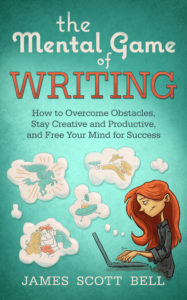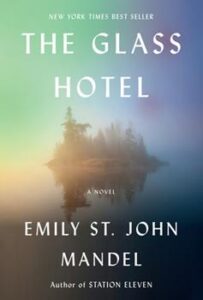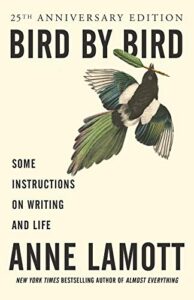by James Scott Bell
@jamesscottbell
 In her excellent recent post Kris wrote:
In her excellent recent post Kris wrote:
I know you’re tempted to dismiss theme as mere enhancement. Le cerise sur la gateau, as the French say. But it’s essential. Try this experiment: Write the back copy for your work in progress — three paragraphs at most. Ha! Can’t do it? Well, you might not have a grip on what your story is about at its heart. Now often your theme doesn’t show itself until you’re well into your plot. Well, that’s okay. But when it begins to whisper, listen hard. Good fiction, Stephen King says, “always begins with story and progresses to theme.”
No matter what you do, your book will have a theme (or meaning) at the end.
Because your characters carry a theme. Always.
Do the good guys win? Justice will triumph.
Do the bad guys win? Justice is a myth. (This is the theme of Woody Allen’s Crimes and Misdemeanors.)
So: you can set out to say something, or can wait to see what you’re saying. But say something you will.
As Viktor Frankl puts it in his classic book on the subject, “Man’s search for meaning is the ultimate motivation in his life.” It is a subconscious reason readers pick up books. In the fictional search, they also are exploring their own inner territory.
Vision
Develop a vision for yourself as a writer. Make it something that excites you. Turn that into a mission statement—one paragraph that sums up your hopes and dreams as a writer. Read this regularly. Revise it from time to time to reflect your growth.
Root that inspiration in the world—your observations of it, and what it does to you. “I honestly think in order to be a writer,” says Anne Lamott, “you have to learn to be reverent. If not, why are you writing? Why are you here? Let’s think of reverence as awe, as presence in and openness to the world.”
If you stay true to your own awe, your books cannot help but be charged with meaning. That’s not just a great way to write. It’s a great way to live.
What Theme Is
Theme is a statement about life. It can be implicit or explicit, subtle or overt. But it must come through fully realized characters engaged in a believable plot. Otherwise the book will come across as a thinly veiled essay, sermon, or jeremiad.
Now, there is nothing wrong with “message fiction.” In message fiction an author says to the reader: I have strong, heartfelt beliefs about this issue — and I think I know what the truth is. I’m going to reveal that truth in this novel, through the lives of these characters, and I hope to convince you to believe as I do. It’s not a matter of shades of grey. There is a right and a wrong here, and everything depends on my convincing you to cling to the right.
But the key word here is not message; it’s fiction. If your book doesn’t work as a story, the message will fall flat.
Uncle Tom’s Cabin is message fiction. So is To Kill a Mockingbird. The Narnia books of C.S. Lewis are message fiction, but they work as engaging stories with characters we care about.
Donald Maass says:
A breakout novelist believes that what she has to say is not just worth saying, but it is something that must be said… Strong novelists have strong opinions. More to the point, they are not at all afraid to express them.
But the key word here is not message; it’s fiction. If your book doesn’t work as a story, the message will fall flat.
Uncle Tom’s Cabin is message fiction. So is To Kill a Mockingbird. The Narnia books of C.S. Lewis are message fiction, but they work first as engaging stories with characters we care about.
Try This:
- Write down the five things you care most about in the world.
- Now the five people you most admire.
- For each of the above, write 250 words about how you feel about each one, as if you had to convince a skeptic of the truth of your convictions.
- Now pick one of the paragraphs and put that fire and emotion inside your main character. How might your MC show that on the page?
- Go to the end of your WIP (either as written or as it might be written) and ask your character to explain to you what life lesson he or she has learned through the struggle of the plot. (In mythic structure, this is called “the elixir” which the hero carries back to benefit the community.) There’s your theme.
- Or look to your character’s “mirror moment” to find what your story really means.
Over to you now. Do you think about theme before you begin to write? Or do you let it emerge as you go? Or do you not think about it at all?
Is there a theme you see recurring in your writing?
This post is brought to you by the audio version of The Mental Game of Writing. I was invited to try Kindle Direct Publishing’s beta of “virtual voice” narration. Since I have narrated a few of my writing books, this is an experiment in saving massive amounts of time. What took me 10-15 hours before (narrating, editing, etc.) now takes 10-15 minutes to set up and go live. You can listen to a sample of the result here.







